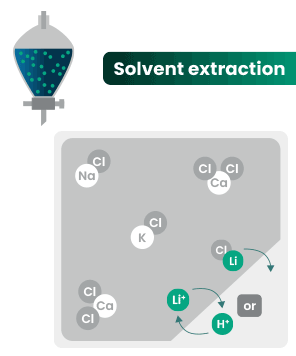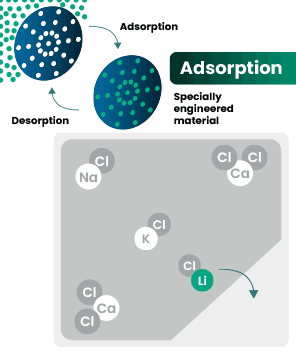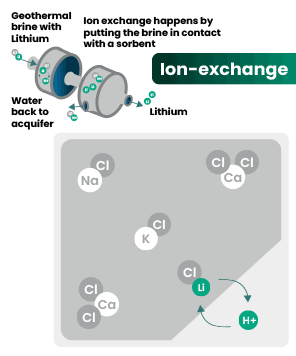Understanding Lithium extraction: DLE and traditional approaches
Lithium is essential for batteries powering electric vehicles, renewable energy storage, and mobile devices. Direct Lithium Extraction (DLE) is a next-generation technology that efficiently recovers lithium from underground brine, using far less water, land, and time than traditional methods. For Swiss Geo Energy, DLE will play a key role in securing a sustainable lithium supply for Switzerland and Europe.
DLE extraction:
In a nutshell
Direct Lithium Extraction (DLE) offers a modern approach to lithium recovery that is faster, cleaner, and more efficient than traditional mining or evaporation ponds. It selectively extracts lithium from brine while returning the rest of the water underground — preserving natural resources and minimising environmental impact.
DLE transforms and speeds up lithium extraction for a sustainable future
Swiss Geo Energy integrates Direct Lithium Extraction (DLE) with geothermal energy production to maximise resource utilisation while reducing environmental impact. This process uses selective extraction techniques to recover lithium from geothermal brines, addressing growing demand for battery technologies and renewable energy applications.
DLE process with geothermal fluids
DLE extracts lithium from geothermal brines during energy production, recovering lithium before reinjecting fluids into the reservoir. The process yields battery-quality material.
Key advantages for geothermal operations
DLE produces higher-purity lithium while operating within existing geothermal infrastructure. This approach optimises resource recovery and creates additional revenue streams.
Environmental
impact minimised
This method uses existing geothermal infrastructure without additional land requirements while using hydrothermal systems that preserve groundwater resources.
Enhanced project viability
DLE recovers over 90% of lithium from geothermal brines within weeks, creating economic value for geothermal projects while supporting Switzerland's renewable energy transition.

DLE captures lithium from brines
DLE uses different approaches to selectively remove lithium molecules from underground brine while leaving other elements behind.

Hard rock mining:
High environmental cost for lithium
Hard rock mining extracts lithium from crushed rock in open-pit mines. This process requires extensive digging, shipping the material overseas for processing, and multiple refining stages before the lithium reaches battery manufacturers. This approach takes approximately 3 months from mine to market.
Environmental footprint
This method produces emissions, requires significant water and land resources, and recovers only about 70% of available lithium.
The innovation imperative
Growing battery material demand highlights the need for alternatives that reduce emissions, save water, and improve recovery rates.
Lithium extraction by evaporation:
The traditional
brine-based method
The evaporation process extracts lithium from salt brines using a time-intensive natural approach. This method pumps lithium-rich brine into large evaporation ponds, also called salars, processes it through several stages, and eventually produces lithium carbonate after approximately two years.
Resource challenges
This method uses large amounts of water, requires extensive land for evaporation ponds, and recovers only about one-third of the available lithium, despite creating less pollution than mining.
The time factor
The two-year timeline from start to finished product creates long delays in lithium supply, making it difficult to respond quickly to the growing demand for batteries.

DLE in numbers
When compared to hard rock mining and evaporation ponds, DLE demonstrates superior performance across multiple key metrics, including CO2 emissions and water use.
extraction
ponds
lead time
lead time
2 MDPI (2024), Recent Advances in Lithium Extraction
3 MDPI (2024), Assessing the Viability of Integrating Evaporation and Solvent Extraction Systems for Lithium Recovery from Low-Grade Brines
4 T&E (2024), Unlocking lithium’s potential: How to do it sustainably in Europe
5 Goldman Sachs (2023), Direct Lithium Extraction: A potential game changing technology
Discover Switzerland's geothermal opportunity
Partner with Swiss Geo Energy's systematic clean energy development, where established subsurface expertise creates innovative geothermal solutions. Our comprehensive portfolio scales through three strategic phases—proof of concept, expansion, diversification—delivering consistent returns while driving Switzerland's Energy Transition forward.








